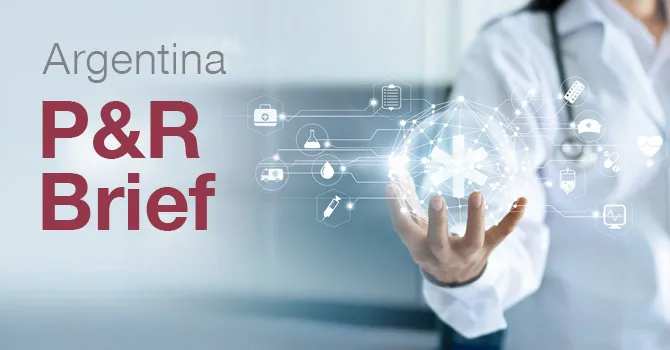Inflation rates keep increasing in Argentina, making it all the more difficult for manufacturers to design good Pricing and Market Access (P&MA) of innovative medicines. In this article, experts Paloma Gutierrez, Pedro Santana, and Vicente Lumbreras explain what manufacturers can do to navigate this difficult landscape.
Argentina has been battling inflation for years, with annual rates among the highest in the world. Despite government measures, the 2021 inflation rate is above 50 percent and there are no signs of significant deceleration for 2022.
Surpassing this already staggering rise in inflation, pharmaceutical drug prices increased 65.9 percent in 2021. As a result, out-of-pocket costs of common prescription drugs have spiked, causing serious patient affordability issues. Several consumer associations have pushed for a government freeze on drug prices, similar to the ones put in place for other first-necessity goods, but it is uncertain whether the government will take action. In Argentina, drug pricing is free, but there have been isolated cases of price control in the past (e.g., SPINRAZA).
Argentina’s payer landscape is highly fragmented, and access differs across payer types. High-cost innovative drugs, when covered, have no patient out-of-pocket cost, so price increases, in this case, impact payer rather than patient affordability. Therefore, in addition to potential drug price control by the government, manufacturers need to consider whether the budget impact of price increases and inflation could be a hurdle for access of new or existing products.
In this article we provide a deep dive into the impact of hyperinflation on single reimbursement system (SUR) funding, as well as access via exception through the Regime of Exception for Access to Medication (RAEM), and payer contracting.
Impact of hyperinflation on SUR funding
SUR is a fund that subsidizes certain high-cost innovative drugs, including oncologic and orphan products, for patients with union Health Maintenance Organization (HMO) coverage, or private coverage via union HMO.
The Superintendence of Health Services (a government entity) manages the SUR budget and determines whether a drug should have funding. For reference, accumulated SUR funding across HMOs in 2020 reached 23.9 billion Argentine Peso (ARS), which is approximately 237 million US dollars (USD) (the exchange rate as of November 26, 2021 was USD 1 to ARS 100.68).
Payers have expressed that many SUR payments are either not honored or significantly delayed. However, as many union HMOs favor products with SUR funding over treatment alternatives without it, inclusion in SUR is still important to unlock patient access.
Once the Superintendence decides to list a drug in SUR, a payment rate is set, covering part of the drug package cost. These payment rates are not updated regularly, so they have been depreciating significantly as inflation drives an increase in drug prices. Payers have to cover the growing gap between price and payment rate, which increases budget impact over time. Despite payers voicing concerns about this issue, the Superintendence has not taken steps to update the rates more frequently (latest in Resolution 465, March 2021).
Seeking SUR listing is still very valuable to unlock patient access in Argentina, but manufacturers need to watch out for payer budget impact concerns stemming from depreciating SUR payment rates. Contracting directly with payers may be a more efficient tool to mitigate concerns around budget impact uncertainty in the context of hyperinflation.
Impact of hyperinflation on access via exception through the RAEM
Exceptional access through the RAEM is commonly used for orphan drugs with US Food and Drug Administration (FDA) or European Medicines Agency (EMA) approval, without registration with the National Administration of Drugs, Foods, and Medical Devices (ANMAT), Argentina’s regulatory authority.
Patients can import the drug needed for treatment with an authorization from the ANMAT, and payers pay the import price in foreign currency (typically in US dollars). For instance, prior to ANMAT approval, SPINRAZA had access through the RAEM at the US whole acquisition cost (WAC) price of USD 125,000 per injection.
US dollar exchange is becoming significantly restricted in Argentina, and currently, there are seven exchange rates – depending on the channel used to purchase the dollars. In this context, it is becoming more and more challenging for payers to pay import prices in US dollars for drugs with access through the RAEM. Combined with the serious devaluation of the Argentine peso, the budget impact from paying for these drugs at the US price can be ruinous for payers.
Manufacturers with drugs going through the RAEM in Argentina should monitor payer sentiment closely. If a drug price starts receiving significant payer scrutiny, it may be advisable to reevaluate the opportunities and risks of gaining ANMAT approval in the short term to have a list price in local currency.
Impact of hyperinflation on payer contracting
Manufacturers are free to increase list prices to protect against devaluation of the Argentine peso, but what about the confidential net prices negotiated with payers?
Free list prices in Argentina are often above payers’ ability to pay, so contracting is generally required to gain access. These net prices are signed in agreements called “convenios,” and so far, payers have allowed for inflation adjustments every three to six months. Therefore, manufacturers also have protection at the net level from currency devaluation and should continue to leverage contracting to gain and keep access.
Conclusion
In summary, it is highly important for manufacturers to monitor the hyperinflation in Argentina, as it can impact P&MA of pharmaceutical drugs in different ways. If you have any questions or need support with a specific product in Argentina, our experts would be happy to provide advice. Don’t hesitate to get in touch!

